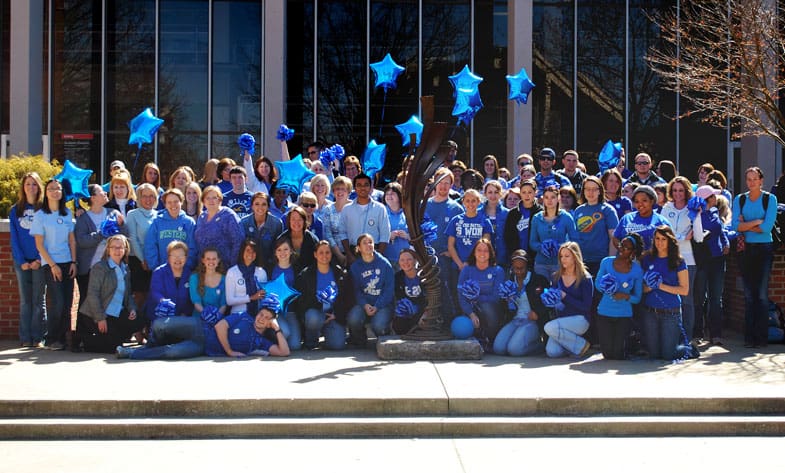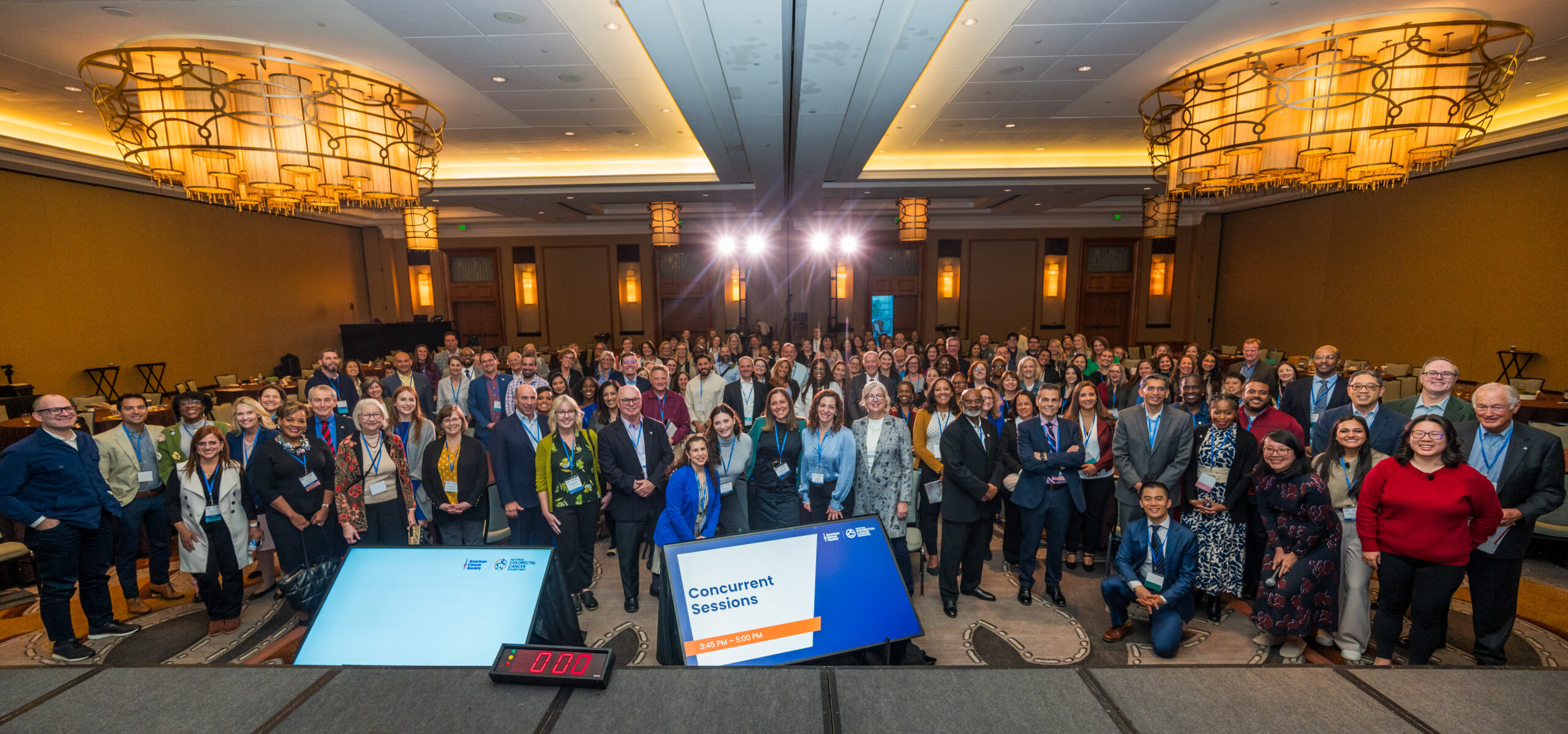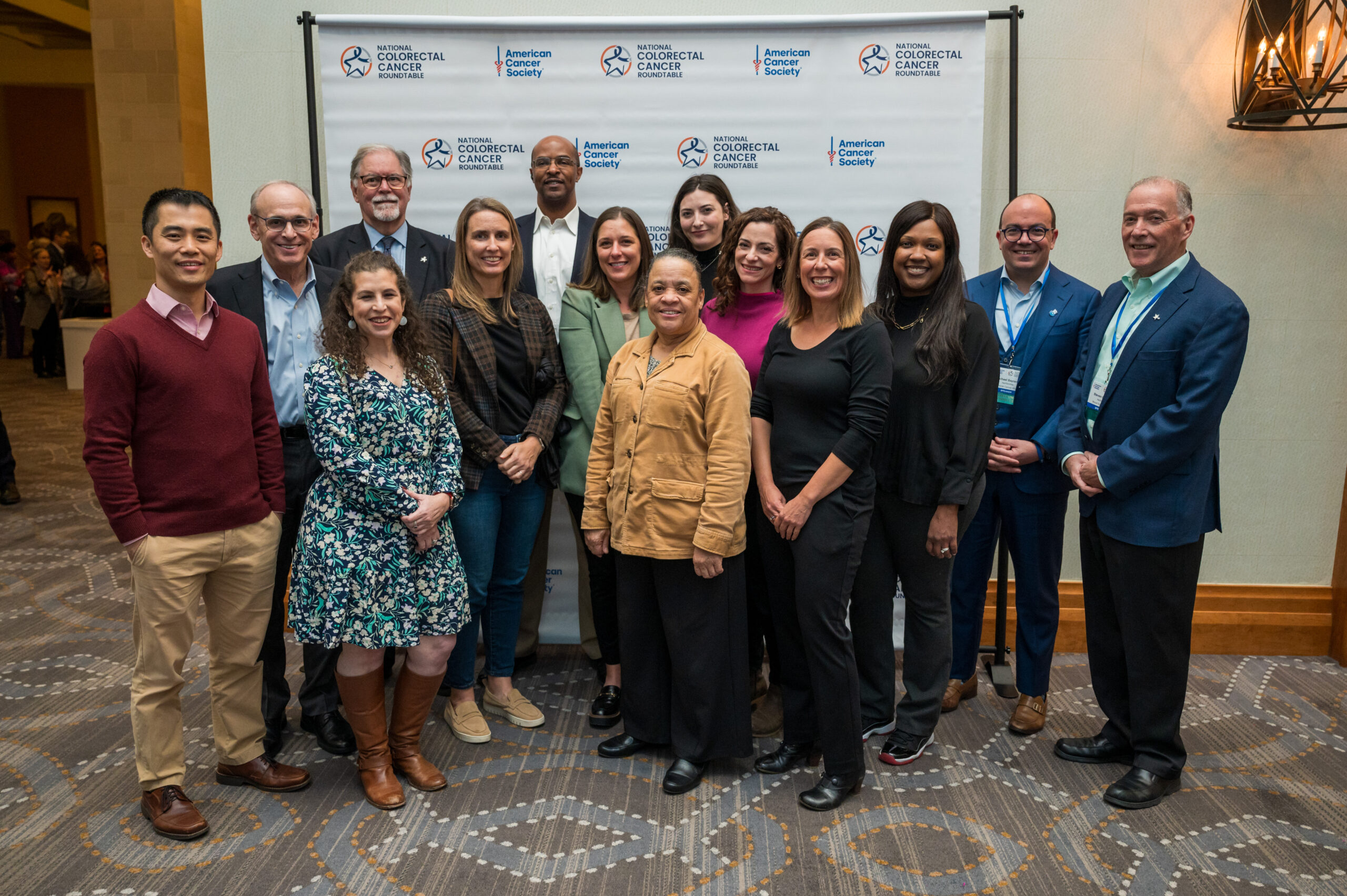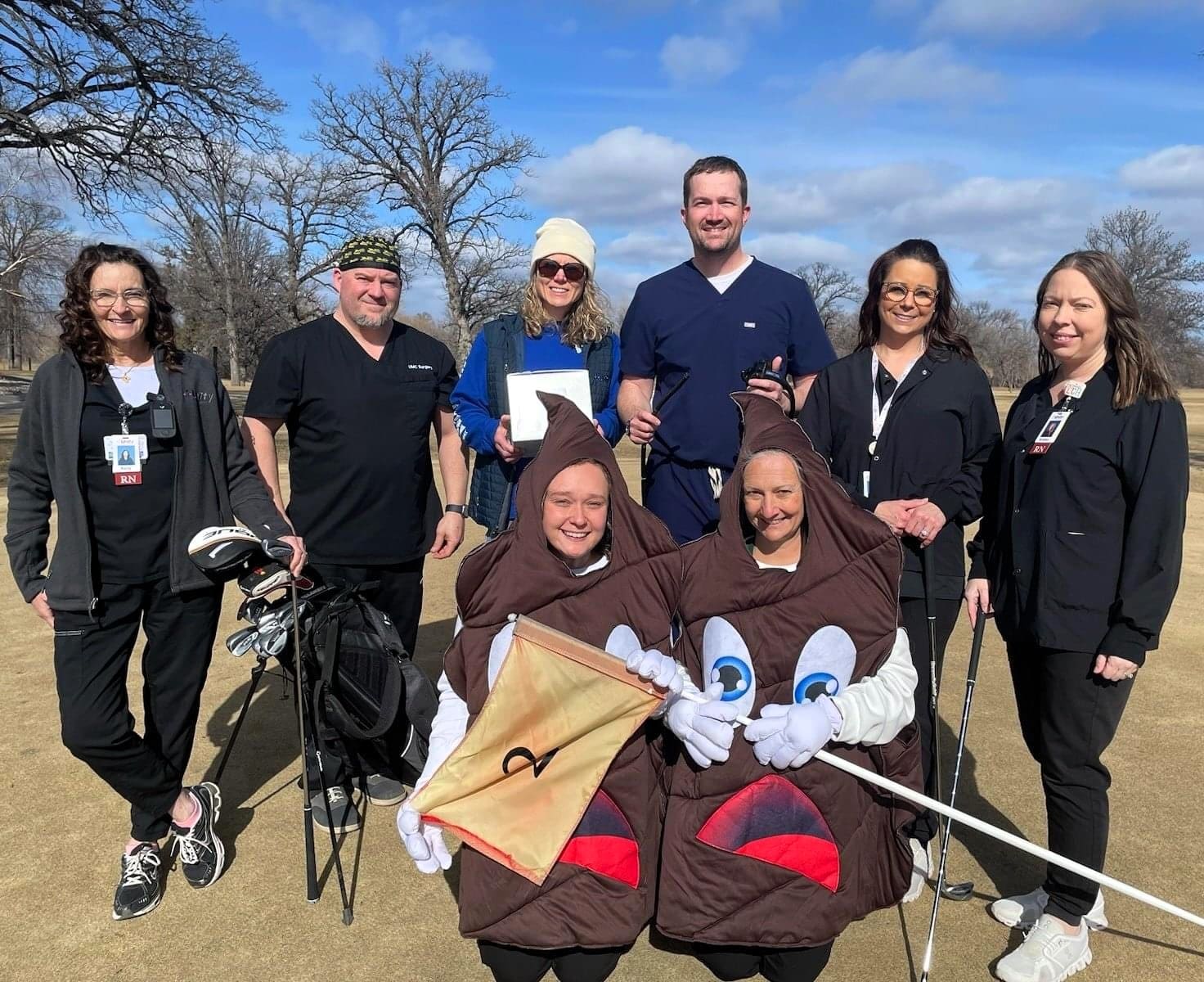Interview with Kentucky Cancer Consortium—80% By 2018 National Achievement Award Honoree

September 25, 2019 – Author: Jennifer Redmond Knight, DrPH
In March 2019 Kentucky Cancer Consortium became an Honoree recipient of one of the 80% by 2018 National Achievement Awards, a program designed to recognize individuals and organizations who are dedicating their time, talent and expertise to advancing needed initiatives that support the shared goal to achieve colorectal cancer screening rates of 80% and higher.
 Dr. Jennifer Redmond Knight is a part-time Assistant Professor in the Department of Health Management and Policy and is a member of the University of Kentucky Markey Cancer Center Cancer Control Program. She serves as the evaluation and sustainability specialist for the Kentucky Cancer Consortium, as co-principal Investigator for the Kentucky LEADS (Lung Cancer, Education, Awareness, Survivorship) Implementation of Quality Lung Cancer Screening Component, and as the principal investigator for a Lung Cancer Health Equity grant focused on workplaces with predominantly male employees. Her recent publications focus on lung cancer screening, an environmental scanning process and understanding barriers to colorectal cancer screening in Kentucky. She has extensive experience in group facilitation, partnership sustainability, program development, epidemiology, evaluation and policy, systems and environmental change efforts. Dr. Knight specializes in building trust with stakeholders, and maintaining positive relationships across governmental, private, and nonprofit sectors, while building enthusiasm and support around complex issues in public health. Her current primary focus areas relate to Health Care Reform/Health Care Access and Cancer, Lung Cancer Prevention and Early Detection, Colon Cancer Prevention and Early Detection and cancer prevention and control evaluation.
Dr. Jennifer Redmond Knight is a part-time Assistant Professor in the Department of Health Management and Policy and is a member of the University of Kentucky Markey Cancer Center Cancer Control Program. She serves as the evaluation and sustainability specialist for the Kentucky Cancer Consortium, as co-principal Investigator for the Kentucky LEADS (Lung Cancer, Education, Awareness, Survivorship) Implementation of Quality Lung Cancer Screening Component, and as the principal investigator for a Lung Cancer Health Equity grant focused on workplaces with predominantly male employees. Her recent publications focus on lung cancer screening, an environmental scanning process and understanding barriers to colorectal cancer screening in Kentucky. She has extensive experience in group facilitation, partnership sustainability, program development, epidemiology, evaluation and policy, systems and environmental change efforts. Dr. Knight specializes in building trust with stakeholders, and maintaining positive relationships across governmental, private, and nonprofit sectors, while building enthusiasm and support around complex issues in public health. Her current primary focus areas relate to Health Care Reform/Health Care Access and Cancer, Lung Cancer Prevention and Early Detection, Colon Cancer Prevention and Early Detection and cancer prevention and control evaluation.
We’re excited to feature your work on the 80% Blog. Can you tell us about yourself, and your colorectal cancer screening program at Kentucky Cancer Consortium?
I’m the evaluation and sustainability specialist for the Kentucky Cancer Consortium and have been involved in leading cancer prevention and control efforts at the community and state levels for the past 16 years. Since 2002, the Kentucky Cancer Consortium has prioritized increasing colorectal cancer screening through convening more than 50 collaborative partners and catalyzing these partners to do more together than we could ever do on our own.
Tell us a little bit about Kentucky Cancer Consortium and the organization’s colorectal cancer screening program. How did Kentucky Cancer Consortium come together to collaborate on colorectal cancer screening? How did you identify partners?
The Kentucky Cancer Consortium (KCC) is a statewide comprehensive cancer control coalition comprised of over 70 Kentucky member organizations and 450 partners committed to reducing the significant cancer burden in Kentucky. In 2002-2003, KCC worked closely with the Kentucky Cancer Registry and other founding members, the American Cancer Society, American College of Surgeons, Kentucky Cancer Program and the Kentucky Department for Public Health to review surveillance data as well as available evidence-based interventions and selected colorectal cancer screening as a priority.
The KCC staff and founding members invited the entire Consortium membership to be involved, and our partner organization, the Kentucky Cancer Program, invited their local community-based District Cancer Councils to be involved. This group included academia, community-based organizations, health systems, health insurance companies, nonprofits/foundations, state and local government, policy organizations and professional associations. As implementation efforts continued, new partners were identified and invited to be part of the collective effort to increase colorectal cancer screening in Kentucky. This process continues as we continue to recognize gaps and needs in order to address health equity challenges.
What activities and systems changes did you implement, and how did you choose them?
KCC provided an infrastructure and a neutral “table” where partners can “sit” and work together to impact colorectal cancer in Kentucky. This included hosting regular meetings and statewide conferences, and creating opportunities for networking, coordinating, cooperating and collaborating. This infrastructure helped to catalyze efforts from more than 50 organizations who have implemented the following types of interventions: public awareness; education and outreach; provider education and training; health systems changes; policy changes (legislative, executive and organizational); and research. We chose these interventions based on funding opportunities, priorities selected from statewide conferences, reviewing the evidence, identifying champions, recognizing political will, determining needs for the state, and timing. For instance, one of our first policy changes was a statewide colorectal cancer screening program for the uninsured because we realized that we had a large population who could not access screening. However, when the Affordable Care Act was passed and Kentucky expanded Medicaid, Kentucky had one of the lowest uninsured rates in the country. Therefore, we needed to adjust our efforts and work with health systems and communities in order to help those with insurance access screening services. KCC continues to work with partners to review the data, including evaluation data, and determine what needs to be implemented in order to address gaps in screening coverage.What success have you seen? How did you measure that success?
Between 1999 and 2016, our screening rates rose from 34.7% to 70.1%, improving more than any other state in the nation and moving from a ranking of 49th to 17th. As of 2016, one of Kentucky’s 15 Area Development Districts had achieved an 83% screening rate and four others have increased screening rates by more than 30% since 2006. As screening rates have risen, colorectal cancer incidence and mortality rates have declined dramatically. From 2001 through 2015, the incidence rate fell from 68.8% to 51.3% (a 25% decrease), while the mortality rate fell from 22.6% to 16.4% (a 27% decrease). As a result, each year in Kentucky almost 400 Kentuckians who would have been diagnosed with colorectal cancer are not diagnosed with colorectal cancer, and 200 Kentuckians who would have died from colorectal cancer don’t die from it. We measured our success by reviewing our Kentucky Behavioral Risk Factor Surveillance System (BRFSS) survey data as well as our Kentucky Cancer Registry data.What tips would you offer to others that are working to increase colorectal cancer screening in statewide coalitions like yours?
Develop your infrastructure and support funding and staff time to convene partners in a neutral forum (e.g. KCC at the state level and the Kentucky Cancer Program at the regional level). Communicate consistently, clearly and regularly. Take the time needed (which is A LOT!) to build relationships and trust among partners. Keep reviewing the data, monitoring progress and evaluating efforts. Find out what is working well and what needs to be improved or modified. Find out what gaps and needs you have, and work together to address those needs. When you pass statewide, health system or organizational policies, develop a plan to implement those policies. Discuss and develop clear roles and responsibilities for each partner. Bring out the best in others and find as many “win-win” opportunities as you can. Celebrate successes!
Were there tools, trainings or resources that you found helpful?
Tools and resources provided by the following organizations and programs have been particularly helpful: Kentucky Cancer Registry, United States Cancer Statistics, Behavioral Risk Factor Surveillance System, Guide to Community Preventive Services, the National Colorectal Cancer Roundtable (e.g. Guide to the Development of State-Level Colorectal Cancer Coalitions, How to Increase Colorectal Cancer Screening Rates in Practice: A Primary Care Clinician’s Evidence-Based Toolbox and Guide and the 80% by 2018 Communications Guidebook: Recommended Messaging to Reach the Unscreened), CDC’s Comprehensive Cancer Control Program and the extensive resources provided by our partner organizations. We recommend participating in NCCRT trainings when available! Ask your partners and colleagues what they have available, and try to find ways to work together rather than always create something new.
Do you have any final tips for our readers that are working to achieve 80% in Every Community?
In order to achieve 80% in every community, we have to keep listening to our communities, find out what is working and what is not working, and be willing to make adjustments to reach those who have not yet been screened. We also need to work together to ensure that those who have their initial screen come back for their repeat screenings (e.g., annual FIT test). Although our goal is 80% screening in every community, we need to find ways to engage new partners in our states and communities to address colorectal cancer prevention (nutrition, physical activity, environmental exposures, etc.) as well as increasing screening.[vc_widget_sidebar sidebar_id=”sidebar-1″][vc_tweetmeme][vc_facebook]
We Highlight Successes, Leaders, Best Practices, And Tools That Are Making An Impact In The Nationwide Movement To Reach 80% Screened For Colorectal Cancer.
Do you have a suggestion for a future blog topic? We welcome you to share your suggestions by emailing [email protected].
Blog Policy
Opinions expressed in these blog posts are that of the author and do not represent policies of the National Colorectal Cancer Roundtable or the author’s institution.
Our staff moderate all comments on the 80% Blog. While we do not censor based on point of view, we will delete or edit comments that are offensive or off topic. Click here to view full version.
© 2025 American Cancer Society National Colorectal Cancer Roundtable. All rights reserved.


